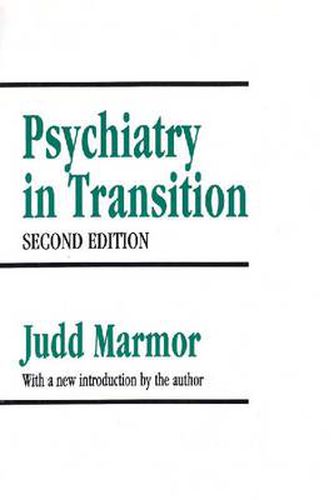Readings Newsletter
Become a Readings Member to make your shopping experience even easier.
Sign in or sign up for free!
You’re not far away from qualifying for FREE standard shipping within Australia
You’ve qualified for FREE standard shipping within Australia
The cart is loading…






When the first edition of Psychiatry in Transition came out, Dr. Gene Usdin wrote that to read Marmor’s papers is to read not only psychiatric history, but also where that history will be in the next decade. That next decade has happened, and Marmor’s papers remain a beacon of professional endeavor. This second edition includes a final chapter on Short-Term Dynamic Psychotherapy, in which the historical background of brief psychotherapy, focusing on the contributions of Freud, Ferenczi, Rand, and Alexander, is examined and synthesized.
Throughout, certain basic themes stand out. First is the necessity for building upon a solid foundation of scientific thought, coupled with a readiness to change theories that do not fit with established facts. Second, Marmor offers a systems theory to replace simplistic, unitary, or linear theories. Third, he presents some common denominators for illuminating the divergent views that characterize contemporary psychiatric theory and practice. The whole is linked by a deep concern with betterment of the human predicament.
Marmor demonstrates that causation in psychiatry can be optimally understood in terms of multiple interacting variables rather than as a response to unitary factors. He foreshadows and predicts developments that are now current in contemporary psychiatric practice, such as the relationship between neurochemistry and behavior, and group therapy with dynamic psychotherapy. He also deals with the importance of cultural and socioeconomic factors in individual personality development. The work concludes with a series of chapters on interethnic hostility, nationalism, and urban violence.
Marmor’s work clarifies the nature of the psychoanalytic process by liberating it from obscurantism and jargon. This book points the way toward unraveling some of the cognitive dissonance in this area. As Leon Eisenberg observed, this is an admirable vade mecum of dynamic psychiatry both for residents in training and clinicians in practice.
$9.00 standard shipping within Australia
FREE standard shipping within Australia for orders over $100.00
Express & International shipping calculated at checkout
When the first edition of Psychiatry in Transition came out, Dr. Gene Usdin wrote that to read Marmor’s papers is to read not only psychiatric history, but also where that history will be in the next decade. That next decade has happened, and Marmor’s papers remain a beacon of professional endeavor. This second edition includes a final chapter on Short-Term Dynamic Psychotherapy, in which the historical background of brief psychotherapy, focusing on the contributions of Freud, Ferenczi, Rand, and Alexander, is examined and synthesized.
Throughout, certain basic themes stand out. First is the necessity for building upon a solid foundation of scientific thought, coupled with a readiness to change theories that do not fit with established facts. Second, Marmor offers a systems theory to replace simplistic, unitary, or linear theories. Third, he presents some common denominators for illuminating the divergent views that characterize contemporary psychiatric theory and practice. The whole is linked by a deep concern with betterment of the human predicament.
Marmor demonstrates that causation in psychiatry can be optimally understood in terms of multiple interacting variables rather than as a response to unitary factors. He foreshadows and predicts developments that are now current in contemporary psychiatric practice, such as the relationship between neurochemistry and behavior, and group therapy with dynamic psychotherapy. He also deals with the importance of cultural and socioeconomic factors in individual personality development. The work concludes with a series of chapters on interethnic hostility, nationalism, and urban violence.
Marmor’s work clarifies the nature of the psychoanalytic process by liberating it from obscurantism and jargon. This book points the way toward unraveling some of the cognitive dissonance in this area. As Leon Eisenberg observed, this is an admirable vade mecum of dynamic psychiatry both for residents in training and clinicians in practice.